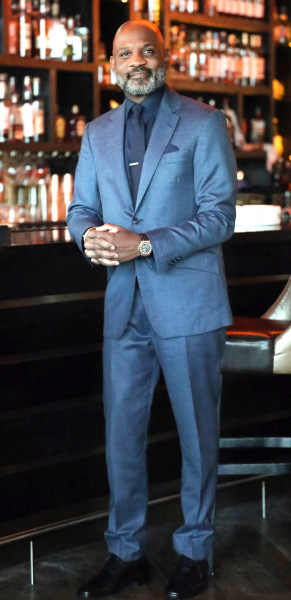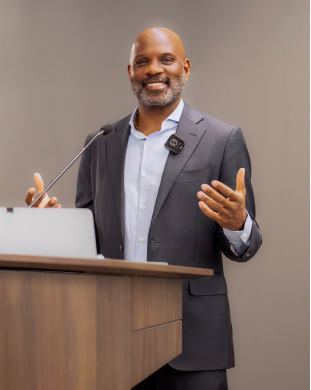THE POWER TO PERSIST
THE JOURNEY OF DR. LAMELL MCMORRIS
There’s a question I often ask myself when I meet someone who has climbed seemingly insurmountable mountains in life: What kept them going when it would have been easier to stop? For Dr. Lamell McMorris, the answer is resilience—not just as a concept, but as a way of living. His story is one of grit, grace, and the kind of determination that inspires the rest of us to rise a little higher, even when life insists on dragging us down.

Dr. McMorris is not just an entrepreneur, policymaker, or civil rights advocate—though he is all of these, and more. He is a bridge-builder, a man who has seamlessly moved across the private, public, and nonprofit sectors while keeping his compass set firmly on one true north: creating lasting impact.
As founder and CEO of Phase 2 Consulting, a Washington, D.C.-based firm, McMorris has advised Fortune 100 companies, policy leaders, and decision-makers across industries. His expertise in external affairs and strategic guidance has made him a sought-after voice in boardrooms and policy circles alike. But what defines him more than his resume is his story—a journey that began in Chicago’s Woodlawn neighborhood, where violence and adversity threatened to limit his future, but instead forged the strength that fuels him today.
Roots That Ground, Struggles That Shape
Chicago’s South Side is both a place of hardship and deep cultural pride. It is also where Dr. McMorris began shaping his worldview. Growing up in Woodlawn, he was surrounded by challenges that could have easily derailed his path. Life-threatening violence, scarce opportunities, and systemic barriers stood as everyday obstacles. Yet rather than break him, they made him.
Those early struggles became the soil from which his resilience grew. His firm, Greenlining Realty USA, is a living tribute to those roots. Dedicated to revitalizing historically distressed communities, Greenlining builds mixed-use projects designed to create generational wealth and economic mobility. And in a poignant full-circle moment, McMorris chose to begin this work in his own childhood neighborhood—where his mother still resides.
For him, community transformation is not an abstract concept. It is deeply personal, anchored in the people and streets that shaped him. That’s the heart of McMorris: wherever he goes, whatever he builds, he carries his community with him.
A Career Built on Persistence
Before Phase 2 Consulting, McMorris founded Perennial Sports, a full-service agency representing NFL and NBA players and media personalities. That move might surprise some, but for McMorris, the leap from sports to strategy was a natural one. Both fields require discipline, focus, and the ability to see the big picture while navigating moment-to-moment challenges.
Over the years, McMorris has served on nonprofit boards, including the National Urban League and PGA REACH. He is also a frequent keynote speaker at conferences nationwide, where his insights on leadership, equity, and resilience resonate with audiences hungry for authentic voices.
It’s no wonder he’s been called a high-impact advocate. Whether standing beside civil rights leaders, advising CEOs, or shaking hands in his own neighborhood, McMorris leads with the same purpose: service.

The Book He Never Planned to Write For someone with such a dynamic career, it’s almost ironic that McMorris never set out to write a book. But as he admits, people kept asking him the same question: “How do you keep going?”
That question became the foundation for The Power to Persist: 8 Simple Habits to Build Lifelong Resilience, which will be released this September. The book is part memoir, part blueprint, and all heart. It shares the habits that have fueled his rise: attitude, work ethic, agility, vulnerability, network, focus, determination, and faith.
This is not a dry, academic take on resilience. It’s lived wisdom. Reverend Al Sharpton, who wrote the foreword, put it best: “Lamell has been punched a few times—he’s been knocked down, discarded, marginalized—but every time, he found a way to bounce back and win the fight”.
That authenticity—the willingness to talk about being knocked down—is what makes this book different. McMorris isn’t selling perfection. He’s offering persistence.
Lessons in Resilience What makes McMorris’ story resonate so powerfully is the universality of his lessons. You don’t have to be an entrepreneur or a policymaker to relate to setbacks. We all get “punched in the face” by life, as Mike Tyson famously said. The question is: what happens next?
McMorris’ eight habits aren’t theoretical—they’re practical. They remind us that resilience is not about pretending pain doesn’t exist, but about building the muscles to carry it, learn from it, and keep moving forward.
Consider “agility.” In an age when industries shift overnight and careers can turn upside down, the ability to pivot is invaluable. McMorris himself moved from sports management to consulting, from neighborhood advocacy to national boardrooms. Each time, agility allowed him not just to survive the transition, but to thrive.
Or “vulnerability.” Too often, especially in leadership, vulnerability is mistaken for weakness. But McMorris shows how openness—to feedback, to failure, to being human—is a powerful tool for growth.
And then there’s “faith.” For McMorris, it is not a vague idea, but a grounding force that carried him through uncertainty. It’s what allowed him to see beyond the barriers of his youth and imagine a future filled with possibility.
The Power to Inspire
What makes Lamell McMorris’ story so compelling is not just what he’s accomplished—it’s what he represents. He is proof that resilience is not innate but cultivated. That leadership is not about titles, but about service. That success is not about escaping your roots, but about using them as the foundation for impact.
His podcast, also called The Power to Persist, continues this mission. Featuring conversations with leaders, changemakers, and everyday people, it amplifies stories of endurance and adaptation. It’s a reminder that resilience doesn’t belong only to those in the spotlight—it belongs to all of us.
Why It Matters Now
We live in a time when resilience feels like the currency of survival. Between global uncertainty, social upheaval, and the relentless pace of modern life, it’s easy to feel worn down. McMorris’ work—whether through consulting, real estate development, or his book—isn’t just timely. It’s necessary.
He is offering us tools to not only endure but to thrive. And perhaps more importantly, he’s offering his story as proof that it’s possible.
As I reflect on McMorris’ journey, I think about my own life and career here in New York. I’ve seen how easy it is to get lost in the noise, to let setbacks become stop signs. But McMorris reminds me—and all of us—that persistence is not about never falling. It’s about rising, again and again, with greater clarity and conviction.
In his book, he gives us eight habits. But in his life, he gives us something even more powerful: the example of what it means to live them.
So, the next time I’m asked how someone keeps going, I’ll point to Dr. Lamell McMorris. Because if his story teaches us anything, it’s this: resilience is not the absence of struggle—it’s the presence of spirit.
And that, in the end, is the power to persist.





